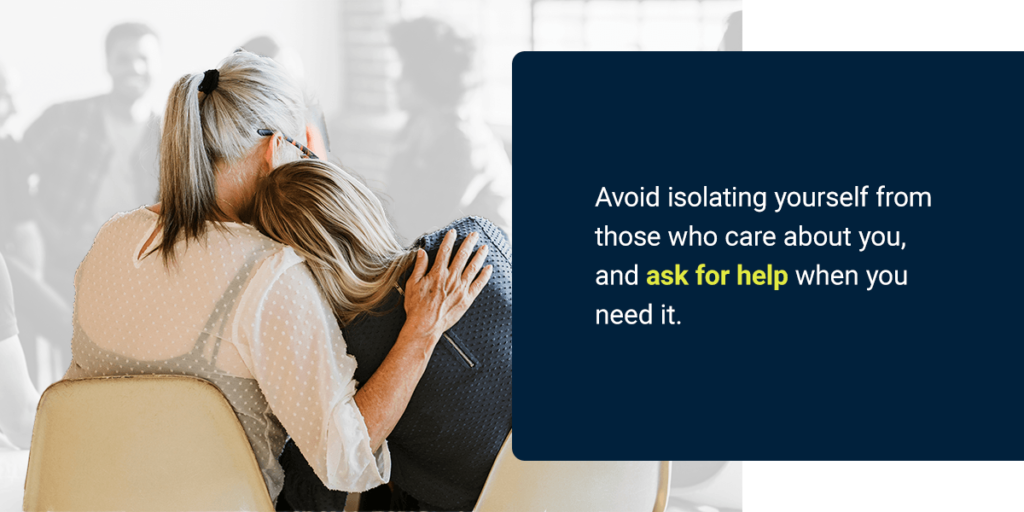- Dec 14
- Recovery

Recovery is a lifelong process that offers hope for people overcoming substance use disorder. Individuals can overcome challenges in recovery when they remember important things, like their progress, goals, and healthy habits.
The recovery process teaches individuals positive coping skills, such as how to take care of their mental and physical health, skills for maintaining sobriety, and how to foster healthy relationships. Some essential reminders can help people remain positive and on track in their journey. These 10 factors are the most important things to remember in recovery:
1. How Far You Have Come
Remembering how far you have come and all that you have accomplished so far in your recovery journey is excellent motivation. Whether you have taken the first step in recovery or have completed your treatment program, reflecting on your progress can inspire you to keep working through treatment and continue maintaining your sobriety afterward. On days when recovery feels challenging, remind yourself of the challenges you already overcame and how much you have grown.
2. How Far You Can Go
Reminding yourself how far you can go is just as important as reflecting on how far you have come. You can combat cravings and protect your sobriety by looking forward to a happy and healthy life ahead of you. When you need some extra support and motivation, seek others who are farther along in their recovery journey for inspiration. Attending 12-step meetings or self-help groups allow you to hear how far others have come and realize how far you can go.
3. Your Recovery and Life Goals
A significant part of reminding yourself how far you can go is remembering your goals. Reminding yourself what you want to work toward in life can benefit your recovery.
Your main goal when you begin treatment may be to abstain from substance use or build healthy coping skills. As you progress in treatment, you may develop goals beyond recovery such as getting a job, earning a college degree, reconnecting with loved ones, engaging in more physical activity, or learning a new skill.
Keeping recovery and life goals in mind can benefit your future and keep your recovery plan on track. Develop small daily habits that help you work toward short-term and long-term goals to remind yourself what you want to accomplish in recovery and in life.
4. Your New Healthy Habits and the Life You’ve Created
Early addiction treatment teaches you healthy habits and coping skills so you can avoid using substances and build a sober lifestyle. Remembering these healthy skills and habits is essential to maintaining sobriety.
Habits such as healthy eating, exercise, meditation, and emotional regulation help you maintain physical and mental health to maintain sobriety. Healthy coping skills can help you manage mental health conditions and co-occurring disorders to resist cravings and overcome challenges without using drugs or alcohol.
5. Your Support System
A compassionate support system is crucial to the recovery process, so it’s important to remember where you can seek support when you need it. Your support system may include your family, friends, counselors, therapists, recovery specialists, support groups, and a sponsor. Avoid isolating yourself from those who care about you, and ask for help when you need it.

Remembering you have a support system is invaluable in recovery. Continue to attend 12-step and group meetings after you complete your treatment program so you stay close to your support system. It may feel tempting to stop attending meetings or end therapy services when recovery is going well and you feel good. However, staying connected to your support system can help you maintain a positive attitude, prevent negative thinking and remember who you can lean on when you face challenges.
6. The Importance of Patience
It’s also important to remind yourself that recovery from substance use disorder takes time. This is especially helpful in early recovery when you may face more challenges and self-doubt. Have compassion and be patient with yourself. If it feels like your recovery process is taking longer than you expected or you believe you’re behind on progress, remember that your hard work will benefit you in the future.
7. Growth Matters More Than Perfection
Growth is more important than perfection. Recovering from drug or alcohol addiction doesn’t guarantee a perfect life, but it does help you build a healthier and more fulfilling life. Remind yourself daily that personal growth is more important than being perfect at everything. As you abstain from substances, you can work toward nurturing your relationships, building your skills, and improving your health gradually.
8. Potential Triggers
Certain situations can trigger drug or alcohol cravings if they remind you of times you used a substance. Remembering what your triggers are can help you avoid people, places, and activities that may cause cravings. Take time to create a list of potential triggers and develop a plan to avoid them. You may need to step away from unhealthy relationships and focus on new, healthy friendships. You may also need to avoid certain places such as bars or locations where you used substances in the past.
9. Personal Boundaries
Remembering to set personal boundaries is an important form of self-care. As you recover, it’s essential to set boundaries with others in your life so you can maintain healthy relationships that grow with you. Establishing what you are and are not willing to do can help you avoid reverting to past behavior patterns. Boundaries also help you maintain and protect the space you need to focus on recovery.
Remember that it’s okay to say “no” to invitations or requests you are not comfortable with. Remain true to your values, morals, and recovery principles, and walk away if people disrespect you or your goals.
10. Recovery Is a Lifelong Process
Reminding yourself that recovery is an ongoing process will help you maintain sobriety long after you complete treatment. When you remember that recovery continues after treatment, you can take proactive steps to keep your recovery plan on track. Remember to continue practicing the healthy habits and coping skills that helped you stay sober in early recovery, and remain active in your recovery community by attending meetings and helping others when you can.
Addiction recovery is a lifelong process, which means you have a lifetime of healthy choices, growth, and support ahead of you. Focusing on the life you can build in sobriety allows you to move forward with hope.
Find Support With Gateway Foundation
One of the most essential factors in recovery is a support system that can help you remember how far you have come and how far you can go. A team of people who care about your well-being, encourage you, and guide you through the treatment process can significantly impact your experience in recovery and help you grow.
Gateway Foundation offers a wide variety of substance use disorder treatments and programs for an evidence-based and holistic recovery approach. Contact Gateway Foundation to learn more about our treatment services.



